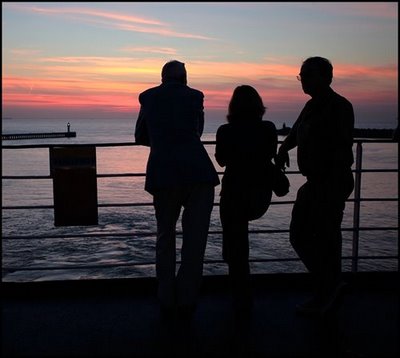
Ferry passengers stand at the railings admiring the sunset as the ship leaves Calais in France, headed for Dover, England.
At the moment we've got terrible problems with our internet connection - a fault on the line, which is making things difficult, like updating my blog. So apologies for the infrequent posts.
On a forum recently a photographer was asking about the business case for investing in medium format digital equipment. The costs talked about for the new Hasselblad H3D system were in the region of 25,000 GBP. Extras like computer equipment to handle the huge files and a full set of lenses were also raised.
I thought I'd share my thoughts on the forum with you here...
"If you need a camera for a particular job, but not on a day to day basis then hiring it is an obvious way to go. I know a pro in London who doesn't own a single camera. He hires whatever he needs and charges it on to the client, as you would any expense ( for eg. lunch, travel, lights, model, stylist etc).
Given your area of work (portraits and weddings mostly), I would think that DSLRs would do you fine and you'd only need a Hasselblad occassionally.
There is an aura around that brand name and I own two Hasselblads which have served me well over the years but I now really do prefer working with my Canon 5D. It's fast (compared to the Hasselblad), light, flexible and delivers files that will keep most clients happy. Just shot a billboard, bus shelter advertising campaign with the 5D and there're no complaints about the quality, on the contrary. So you if you can hire a Hasselblad, why tie capital up in an outright purchase?"
In the end the photographer asking the question was going to take a look at second-hand digital MF cameras, which would involve a much lower investment.
With the work I do my strategy is to shoot film if I need to deliver MF or large format for a client, or if digital is really needed then I'll hire what's required. My full frame Canon DSLR delivers the quality I need on a day to day basis. Personally I can't make the business case to tie up that much capital in a camera, especially at the rate that digital equipment is evolving (read devaluing).
Always happy to hear your views.
Cheers,
Paul

Comments
(Excuse my English)